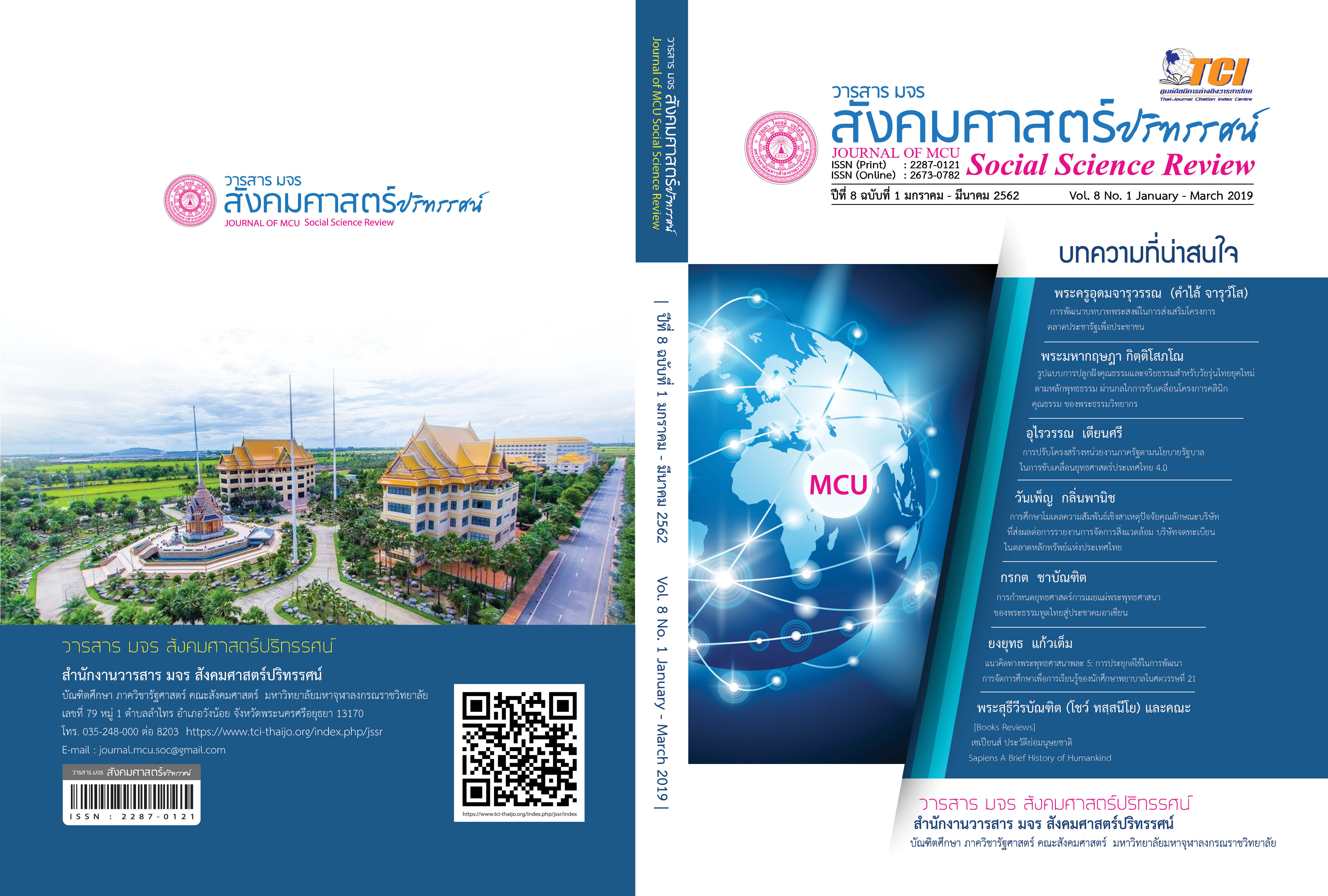การพัฒนาการท่องเที่ยวทางวัฒนธรรมสำหรับผู้สูงอายุ
คำสำคัญ:
การท่องเที่ยวทางวัฒนธรรม, ผู้สูงอายุบทคัดย่อ
การศึกษาเรื่อง “การพัฒนาการท่องเที่ยวทางวัฒนธรรมสำหรับผู้สูงอายุ” มีวัตถุประสงค์การศึกษา 3 ข้อได้แก่ (1) เพื่อศึกษาและวิเคราะห์ความคิดเห็นของผู้สูงอายุต่อการพัฒนาการท่องเที่ยวทางวัฒนธรรมสำหรับผู้สูงอายุ (2) เพื่อวิเคราะห์แนวทางและเครือข่ายการพัฒนาการท่องเที่ยวทางวัฒนธรรมสำหรับผู้สูงอายุ และ (3) เพื่อเสนอรูปแบบนโยบายการพัฒนาการท่องเที่ยวทางวัฒนธรรมสำหรับผู้สูงอายุ โดยการศึกษาครั้งนี้เป็นการวิจัยเชิงผสมผสานแบ่งออกเป็นการวิจัยเชิงปริมาณ เพื่อสำรวจและวิเคราะห์ความคิดเห็นของกลุ่มตัวอย่างที่เป็นผู้สูงอายุและเดินทางท่องเที่ยวในแหล่งท่องเที่ยวทางวัฒนธรรมที่เป็นพื้นที่ทำการศึกษาวิจัย 12 แห่งทั่วประเทศจำนวน 416 คน ส่วนการวิจัยเชิงคุณภาพดำเนินการศึกษาวิจัยเชิงเอกสารเกี่ยวกับการท่องเที่ยวทางวัฒนธรรมและสถานการณ์ของสังคมผู้สูงอายุ และการเก็บข้อมูลภาคสนามจากผู้ที่มีความรู้หรือมีประสบการณ์เกี่ยวกับการบริหารจัดการแหล่งท่องเที่ยวทางวัฒนธรรมในพื้นที่ต่างๆ อีกจำนวน 20 คน ผลการศึกษาพบว่า ประการที่หนึ่ง ความคิดเห็นของผู้สูงอายุต่อการพัฒนาการท่องเที่ยวทางวัฒนธรรม เหตุผลในการตัดสินใจท่องเที่ยวแหล่งท่องเที่ยวทางวัฒนธรรมสำหรับกลุ่มตัวอย่างส่วนใหญ่ต้องการพักผ่อนกับครอบครัว รองลงมาคือต้องการไหว้พระเพื่อขอพรและทำบุญ และแหล่งท่องเที่ยวทางวัฒนธรรมมีการประชาสัมพันธ์และกิจกรรมที่ดึงดูดใจตามลำดับ ขณะที่ความคิดเห็นของกลุ่มตัวอย่างด้านความคาดหวังต่อแหล่งท่องเที่ยววัฒนธรรมสำหรับผู้สูงอายุ จากระดับไม่เห็นด้วยที่สุดถึงเห็นด้วยที่สุด พบว่ากลุ่มตัวอย่างเห็นด้วยว่าการเก็บค่าเข้ามีผลกระทบต่อการตัดสินใจเข้าชมแหล่งท่องเที่ยวทางพระพุทธศาสนาและวัฒนธรรมมากที่สุด ลำดับถัดมาคือเห็นด้วยว่าแหล่งท่องเที่ยวทางพระพุทธศาสนาและวัฒนธรรมมีบุคลากรให้บริการแก่ผู้สูงอายุอย่างเหมาะสม ประการที่สอง แนวทางและเครือข่ายการพัฒนาการท่องเที่ยวทางวัฒนธรรมสำหรับผู้สูงอายุมี 3 แนวทางสำคัญคือการวิจัยและพัฒนาแหล่งท่องเที่ยวทางวัฒนธรรม การส่งเสริมให้องค์กรปกครองส่วนท้องถิ่นเป็นเจ้าภาพหลักในการพัฒนาการท่องเที่ยว และการพัฒนาระบบธุรกิจการท่องเที่ยวที่ก้าวหน้าและเป็นธรรมแก่นักท่องเที่ยว ขณะที่การพัฒนาเครือข่ายจำเป็นต้องมีเครือข่ายที่สำคัญในการร่วมเป็นภาคีผลักดันการดำเนินงานให้ประสบความสำเร็จอย่างน้อย 3 เครือข่ายคือเครือข่ายท้องถิ่นของแหล่งท่องเที่ยวทางวัฒนธรรม เครือข่ายผู้ประกอบการการท่องเที่ยวทางวัฒนธรรม และเครือข่ายภาครัฐ ประการที่สาม การวิจัยครั้งนี้ได้เสนอรูปแบบนโยบาย 3 รูปแบบเพื่อการพัฒนาและยกระดับปฏิบัติการส่งเสริมการท่องเที่ยวทางวัฒนธรรมสำหรับผู้สูงอายุได้แก่การพัฒนาเส้นทางการท่องเที่ยวทางวัฒนธรรมสำหรับผู้สูงอายุระดับอนุภูมิภาค การพัฒนานโยบายสิทธิประโยชน์ทางภาษีสำหรับผู้สูงอายุและครอบครัว และการพัฒนาข้อมูลสารสนเทศให้กับแหล่งท่องเที่ยวทางวัฒนธรรมสำหรับผู้สูงอายุ ข้อเสนอแนะการวิจัย มี 2 ส่วนได้แก่ข้อเสนอแนะเชิงนโยบายที่สำคัญคือสำนักนายกรัฐมนตรี ต้องเป็นหน่วยงานกลางในการประสานการจัดทำแผนการพัฒนาการท่องเที่ยวทางวัฒนธรรม ร่วมกับกระทรวงการท่องเที่ยวและกีฬา กระทรวงวัฒนธรรม สำนักงานพระพุทธศาสนาแห่งชาติ และกระทรวงการพัฒนาสังคมและความมั่นคงของมนุษย์ โดยกำหนดให้มีกิจกรรมสำหรับการส่งเสริมการท่องเที่ยวให้กับผู้สูงอายุทั้งชาวไทยและชาวต่างประเทศ ขณะที่ข้อเสนอแนะเชิงวิจัยที่สำคัญคือสำนักงานการท่องเที่ยวแห่งประเทศไทย ควรส่งเสริมให้สถาบันการศึกษา นักวิชาการที่มีความรู้ความเข้าใจด้านการท่องเที่ยวและการวิจัยทางสังคมศาสตร์ ดำเนินการศึกษาวิจัยพฤติกรรม ความต้องการและข้อเสนอแนะต่อการพัฒนาแหล่งท่องเที่ยวทางวัฒนธรรมจากนักท่องเที่ยวกลุ่มผู้สูงอายุชาวต่างชาติ
เอกสารอ้างอิง
Evaluation in Upper Northern that Suitable for Elder Tourists under
Slow Tourism Attraction Development in Upper Northern for Elderly
Tourists Programs. Bangkok: National Research council of Thailand.
Tirachinda, Thee and Kanchanakit, Sombat. (January-April 2014). Tourism
promotion for the senior Japanese tourist market to Thailand.
Academic Journal Institute of Physical Education. 6(1).
Phra Suthirattanabundit (Suthit Oboun). (2017). Religious and Cultural
Tourism: Policy, Impact, and Network Management for Promote
Consciousness of Histories and Culture in ASEAN Community. Phra
Nakhon Si Ayutthaya: Mahachulalongkornrajavidyalaya University.
Patarasuk, Waranya. (2009). Research methodology in social sciences.
Bangkok: Chulalongkorn University Printing House.
Pornsiripong, Saowapa and Sasiwongsaroj, Khwanchit and Burasit, Yongyut
(January- June 2014). Preparedness of Buddhist temples for an aging
society. Journal of Language and Culture. 33(1).
Griffin, Raj and Morpeth. (2013). Cultural Tourism, Wallingford. Oxfordshire:
CABI International.
Lim, Chaeyoon and Putnum. (2010). Religion, social networks, and
subjective well-being. American Sociological Review. 75(6): 914-933.
ดาวน์โหลด
เผยแพร่แล้ว
รูปแบบการอ้างอิง
ฉบับ
ประเภทบทความ
สัญญาอนุญาต
ลิขสิทธิ์ (c) 2019 วารสาร มจร สังคมศาสตร์ปริทรรศน์

อนุญาตภายใต้เงื่อนไข Creative Commons Attribution-NonCommercial-NoDerivatives 4.0 International License.
เพื่อให้เป็นไปตามกฎหมายลิขสิทธิ์ ผู้นิพนธ์ทุกท่านต้องลงลายมือชื่อในแบบฟอร์มใบมอบลิขสิทธิ์บทความให้แก่วารสารฯ พร้อมกับบทความต้นฉบับที่ได้แก้ไขครั้งสุดท้าย นอกจากนี้ ผู้นิพนธ์ทุกท่านต้องยืนยันว่าบทความต้นฉบับที่ส่งมาตีพิมพ์นั้น ได้ส่งมาตีพิมพ์เฉพาะในวารสาร มจร สังคมศาสตร์ปริทรรศน์ เพียงแห่งเดียวเท่านั้น หากมีการใช้ภาพหรือตารางหรือเนื้อหาอื่นๆ ของผู้นิพนธ์อื่นที่ปรากฏในสิ่งตีพิมพ์อื่นมาแล้ว ผู้นิพนธ์ต้องขออนุญาตเจ้าของลิขสิทธิ์ก่อน พร้อมทั้งแสดงหนังสือที่ได้รับการยินยอมต่อบรรณาธิการ ก่อนที่บทความจะได้รับการตีพิมพ์ หากไม่เป็นไปตามข้อกำหนดเบื้องต้น ทางวารสารจะถอดบทความของท่านออกโดยไม่มีข้อยกเว้นใดๆ ทั้งสิ้น





